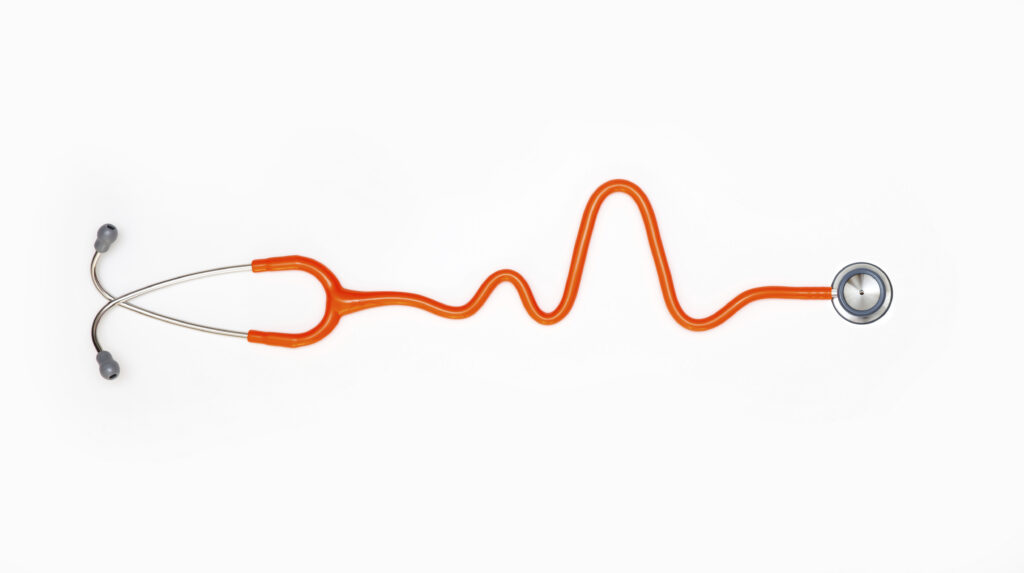The footballing world was shocked back in June when during a Euro 2020 group stage game, Christian Eriksen, a Danish footballer, suffered a cardiac arrest.
Christian Eriksen’s life was saved by the rapid medical treatment he received. A combination of cardiopulmonary resuscitation (CPR) and a defibrillator (a device that delivers an electric shock to the heart), meant he was conscious by the time he was carried off the pitch.
Christian Eriksen was lucky. There are over 30,000 out-of-hospital cardiac arrests in the UK each year, and approximately 12 people under the age of 35 die each week in the UK due to a sudden cardiac arrest.
Cardiac arrest
A cardiac arrest occurs when the heart stops pumping blood around the body. The brain then becomes starved of oxygen, causing the person to fall into unconsciousness and stop breathing. This usually happens without warning. A common cause of cardiac arrest is abnormal heart rhythm, called ventricular fibrillation (VF). VF is when the heart quivers or ‘fibrillates’ rather than pumping steadily, causing chaotic heart rhythms.
Other main causes of cardiac arrest include:
- Heart attack (caused by coronary heart disease)
- Cardiomyopathy
- Congenital heart disease
- Heart valve disease
- Acute myocarditis (inflammation of the heart muscle)
- Hypoxia (drop in oxygen levels)
- Severe haemorrhage
- Drug overdose
- Electrocution
What should I do if somebody is having a cardiac arrest?
The four steps to take if someone is having a cardiac arrest, according to the British Heart Foundation, are:
- Call 999
- Start CPR
- Ask someone to bring a defibrillator if there is one nearby (if there isn’t one, follow the instruction of the 999 call operator)
- Turn on the defibrillator and follow the instructions
Defibrillators
A defibrillator is a device that sends a high energy electric shock to the heart of the person in cardiac arrest. Defibrillators may also be referred to as an AED (automated external defibrillator), a PAD (public access defibrillator) or a ‘defib’. They are an essential part of saving someone’s life.
A recent survey suggested that three quarters of people interviewed said they would not be confident to start CPR and act if they saw someone suffering a cardiac arrest. Anyone can use a defibrillator, you do not need to be trained. The defibrillator will only deliver a shock if needed, a shock cannot be delivered accidentally.
Statistically there is a 57.1% higher survival rate for people with one shock of a defibrillator. With 70% of cardiac arrests taking place at home, increased awareness of CPR and access to defibrillators, as well as lifestyle changes, are key to increasing the survival rate of people suffering cardiac arrests.
Heart attacks
A heart attack is different to a cardiac arrest, and different steps should be taken when they occur.
During a heart attack the person will be conscious and breathing. Blood is still pumping around the body, but blood supply to the heart has become blocked (often as a result of a clot) so there is a circulation problem.
With a heart attack you should not start CPR, as the person is not unconscious. You should call 999 as a heart attack can lead to a cardiac arrest.
Healthy living
Christian Eriksen is a fit athlete who presumably maintains an extremely healthy lifestyle, so some may question why or how he would suffer a cardiac arrest. As an athlete your heart works harder over the course of time, which can cause the walls of your heart muscle to thicken. This leaves less room for blood to be pumped to the rest of the body.
There are many heart conditions, such as cardiomyopathy, which can remain undiagnosed until a cardiac event happens. That is why it is important to reduce the risk factors of cardiac arrest as much as possible.
Risk factors of cardiac arrest include:
- High cholesterol
- High blood pressure
- Diabetes
- Obesity
- Smoking
- Physical inactivity
- Ethnicity
- Air pollution
- Family history
- Stress and mental health conditions
Recovering from cardiac arrest
Recovery after a cardiac arrest can take a long time. It may be that lifestyle changes need to be made. For example:
- Eating healthily
- Quitting smoking
- Cutting down on alcohol consumption
- Being physically active
You may also experience long term effects due to the shortage of oxygen to your brain. These may include:
- Personality changes
- Memory problems
- Fatigue
- Dizziness/problems with balance
- Aphasia/dysphasia (problems with speech and language)
- Involuntary movements (myoclonus)
- Permanent brain injury
Implantable Cardioverter Defibrillator (ICD)
Christian Eriksen has since had an operation to have an ICD implanted inside his body. The ICD device works by sending electrical pulses through the body in order to regulate abnormal heart rhythms (arrhythmia) and prevent cardiac arrest.
ICDs are different to pacemakers, which as the name suggests, tells your heart to produce a heartbeat and maintain a natural pace. They do not admit electric shocks.
The British Heart Foundation has a heart helpline for anyone needing emotional support following implantation of an ICD or diagnosis of a heart condition.
Can I make a cardiac negligence claim?
A cardiac negligence claim can be made following a misdiagnosis or delayed diagnosis of a cardiac condition. A negligence claim can also be made if the treatment you receive is incorrect or delayed.
Some common types of cardiac problems that can occur as a result of negligent medical treatment are:
- Heart failure (pulmonary oedema)
- Abnormal heart rhythms (arrhythmias)
- High blood pressure (hypertension)
- Abdominal aortic aneurysms
- Ischaemic heart disease, including angina and heart attacks (myocardial infarction)
In our experience, we have seen cardiac negligence in:
- Heart surgery – delayed treatment and diagnosis of cardiac arrest leading to brain damage
- Delayed treatment of a high temperature – negligence during heart surgery resulting in brain damage to a child
Most medical procedures are carried out to a high standard of care and the correct signs are spotted, leading to the correct treatment. However failure to act, mistakes in diagnoses and indecision can happen, having serious consequences on an individual’s health and leading to long-term health difficulties.
Please contact our team if there are any issues arising from this article that you would like to discuss.

